Shure MoveMic Two Kit microphone review
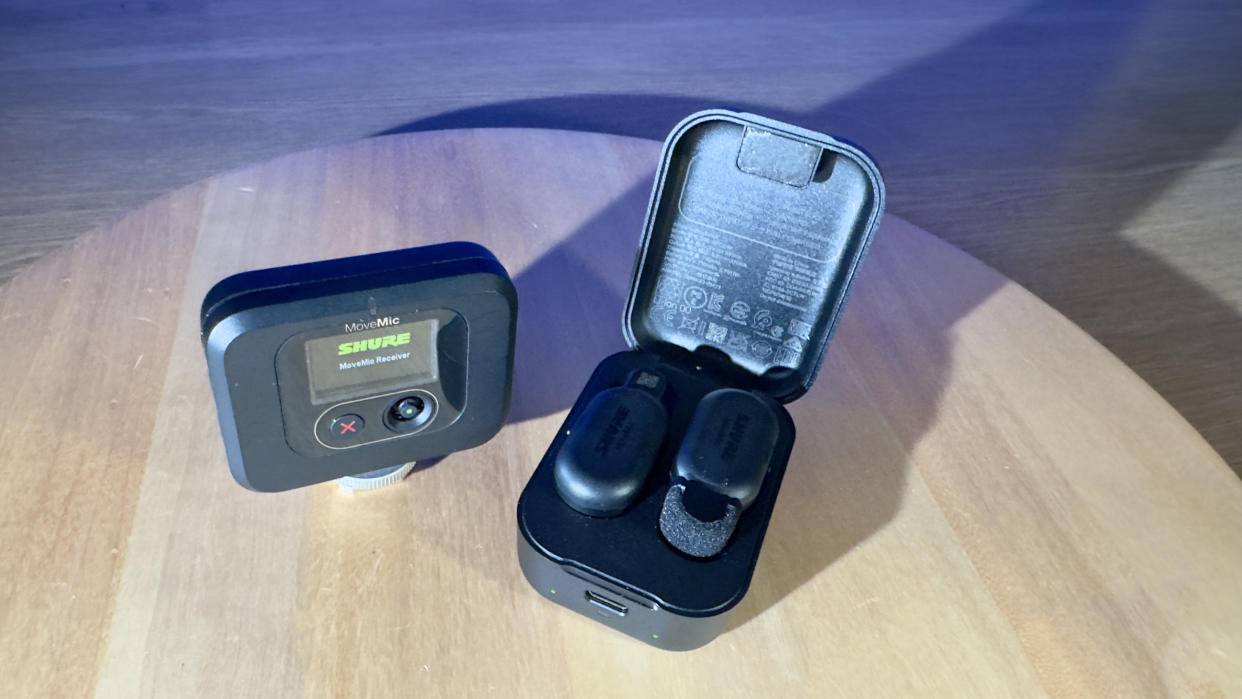
The Shure MoveMic Two kit is the fifteenth wireless lavalier mic kit that I’ve reviewed since 2022, but it’s the first product from Shure that I’ve tested. Shure has a well-established reputation for providing a wide range of high-quality mics for industry professionals, so I was interested to see how the MoveMic 2 shaped up in comparison to the best lavalier mics and best iPhone mics I’ve tested from Hollyland, JOBY, Godox, and Saramonic.
The wireless lavalier mic kits I’ve reviewed vary in price, quality, and functionality. High-end wireless mic kits such as the DJI Mic 2 boast 32-bit floating point onboard recording on their transmitters, so it is almost impossible to record bad sound (or lose audio due to signal dropout). With the evolution of the smartphone into a professional camera, kits such as the Godox WES2 have receivers designed to plug straight into a smartphone without the need for dangling cables.
Despite being released into a crowded marketplace, the Shure MoveMic has one key feature that should make it appeal to camera and smartphone users alike - and we’ll come to that feature in due course…
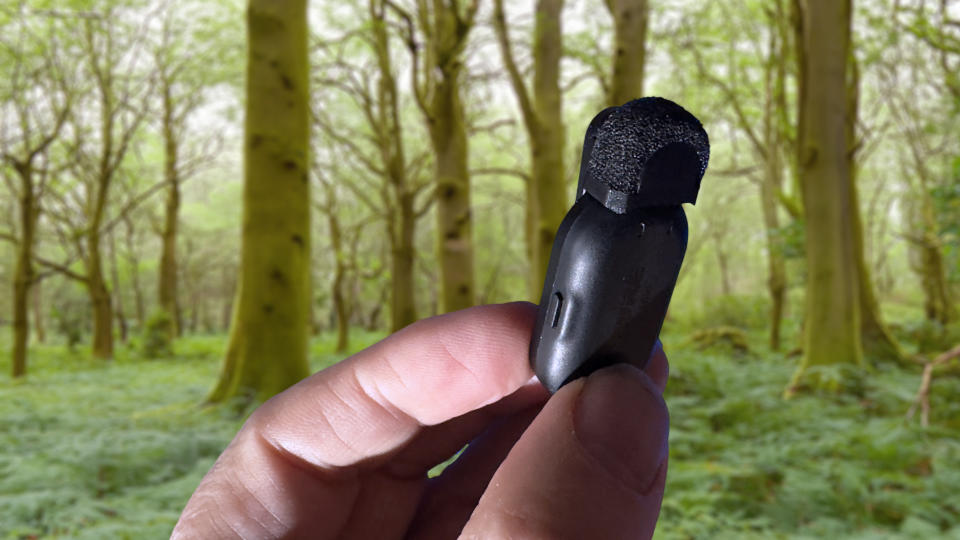
Shure MoveMic: Specifications
Shure MoveMic: Price
The two microphone kit costs $499 / £499, which puts it at a substantial premium over most other mics in this category. Cheaper versions of the MoveMic are available, such as the MoveMic One ($249) which features a single transmitter and no receiver (as you can connect to your smartphone via Bluetooth instead).
Shure MoveMic: Design & Handling
I tested the Shure MoveMic Two Receiver Kit which consists of two plastic transmitter mics and a plastic receiver that you can plug via a supplied cable into a camera. There’s also a USB-C cable to connect it to a smartphone. However, you can also buy the MoveMic Two kit without a receiver (and save yourself around $150!). This is because each MoveMic can transmit wirelessly via Bluetooth directly to your smartphone without the need for a receiver (as long as you record video and audio via the free ShurePlus Motiv Video smartphone app).
The receiver has a connector so it’ll slide into the shoe mount of a camera. The receiver also boasts a screen that you can use to monitor the strength of each MoveMic’s levels and a combined joystick/button lets you scroll through various menu settings to label the mics ‘guest’ and ‘host’, or drop the gain a little.
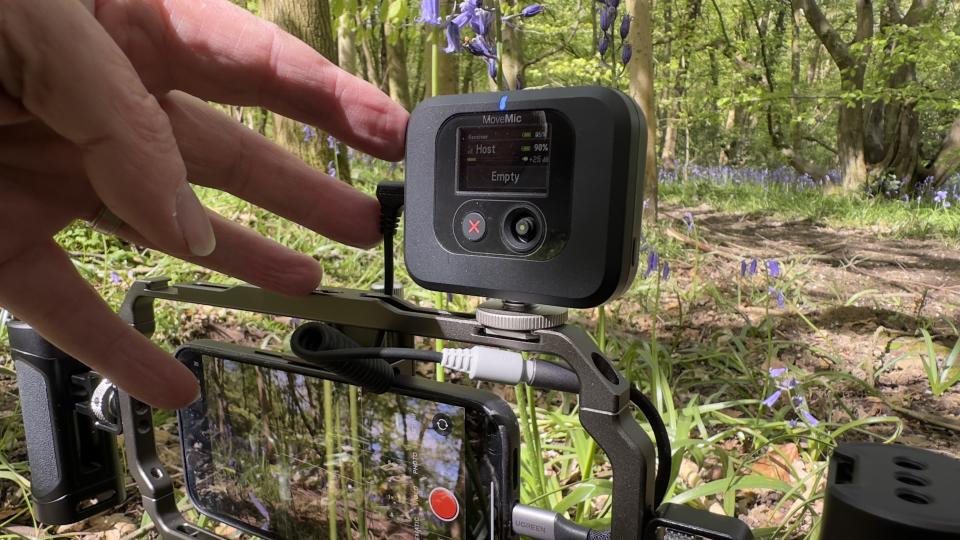
The receiver is the shape and size of typical wireless mic receivers, but the MoveMic transmitters are sleeker and smaller than the usual toy brick-sized units that other manufacturers provide to clip to the clothing of your interview subjects. This results in a more discrete-looking lavalier mic (as you’ll see from our supporting video). The kit ships with two tiny windshields that slide securely onto the transmitter. These are far more discrete than the usual fluffy ‘dead cat’ windshields provided by other manufacturers (and they do a good job of keeping wind rumble to a minimum).
The two transmitters reside in a plastic case that doubles up as a charger. Unlike kits such as the Godox WES2 you have to charge the transmitters and the receiver separately as the receiver doesn’t fit into the charge case. All of the MoveMic Two kit slots into a soft roll bag (along with charging and connecting cables) that doesn’t take up much space in your kit bag.
Shure MoveMic: Performance
To test the MoveMic Two kit I began by popping my iPhone 15 Pro Max into a SmallRig cage. I was able to slide the receiver into one of the cage’s shoe mounts. If you own an older iPhone model you’ll need a third-party jack to lightning adaptor cable to connect the receiver to an iPhone.
By using the receiver I was able to record sound in my iPhone’s native Camera app and enjoy using app-specific modes such as Cinematic to get a background blur. When connecting to an iPhone via Bluetooth (more on that in a sec) you need to use the ShurePlus Motiv Video app which lacks some of the Camera app shooting modes.
I clipped a transmitter to my shirt and recorded myself wandering through the woods. Despite hiding behind trees at a distance there was no drop out of the audio signal (which can happen when a transmitter and receiver lose line of sight with each other). My voice sounded rich and clear as you’ll hear from our recording.
I returned home to test how effective the MoveMic was at transmitting directly to my iPhone without using the receiver. After installing the ShurePlus Motiv Video app I was able to press and hold the MoveMic’s single button for 6 seconds to put it into pairing mode. The app found the MoveMic with ease and once you’ve paired your devices they will chat to each other instantly in the future.
You can use the app to change the behavior of the MoveMic, such as toggling on noise reduction. The app also displays sound levels as you record video and you can change the video resolution and jump between the iPhone’s different cameras in a few taps. I expected the Bluetooth wireless connection between the mic and phone to be less reliable and effective than recording via the receiver but the sound quality was consistent and excellent, much to my surprise.
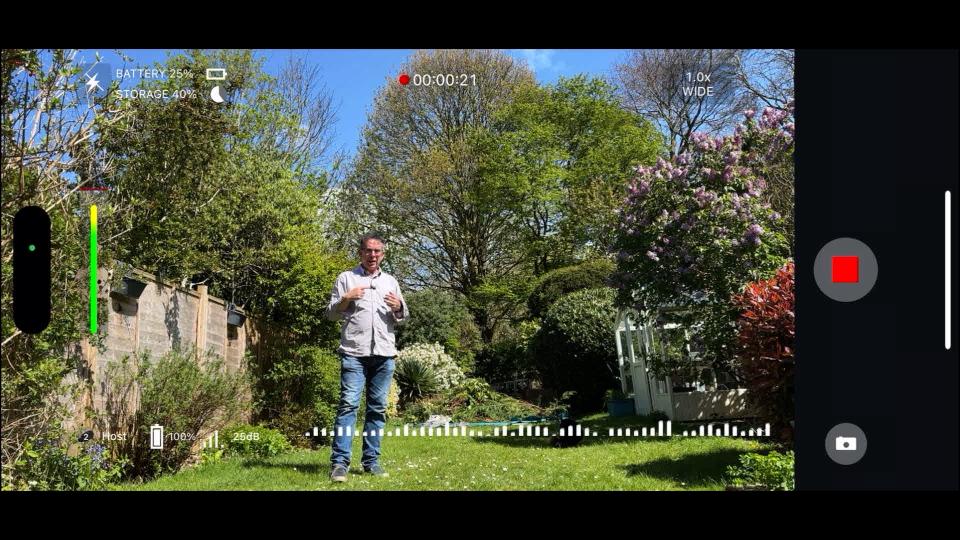
Shure MoveMic: Verdict
The Shure MoveMic Two Receiver Kit should appeal to camera and smartphone users alike. You could transmit to a camera via the cold-shoe mounted receiver while recording an alternative camera angle on your Bluetooth-connected smartphone. If you’re a smartphone-only content creator then you can make a significant saving by purchasing a Shure MoveMic Two kit without a receiver.
Compared to many wireless mic kits the Shure MoveMic Two is relatively expensive, but the sound quality is excellent. The main downside is its comparatively short transmission range of 30 meters means we can’t give it a full 5 stars (though even at 30 meters you’ll barely be able to see someone’s mouth move!)
✅ Buy this if...
You record on both camera and smartphone
You need to improve your audio production values
You want a discrete-looking wireless lavalier mic
🚫 Don't buy this if...
You need the safety net of onboard recording
If you only use a smartphone
Alternatives
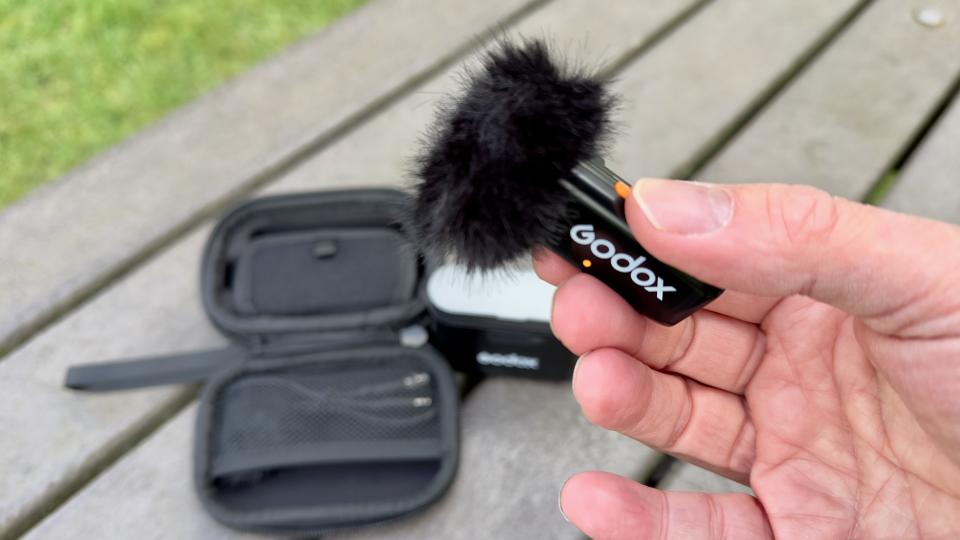
Godox WES2
If you’re a smartphone content creator and want a cheaper budget wireless mic kit, then the Godox WES should meet your needs. The receiver plugs directly into your smartphone’s socket and the sound quality is very good with minimal drop-out when you lose line of sight at a long distance from your phone. Just make sure that you buy the appropriate version of the Godox WES for Android or iPhone.

Boyamic
Released in early 2024, the Boyamic is another iPhone/smartphone-friendly wireless mic kit. Unlike the Godox WES the Boyamic ships with two adaptors that enable you to plug its transmitter into any smartphone or iPhone model. It also has the bonus of onboard recording, which makes it slightly more expensive than the Godox WES - and far cheaper than the Shure MoveMic Two kit.

